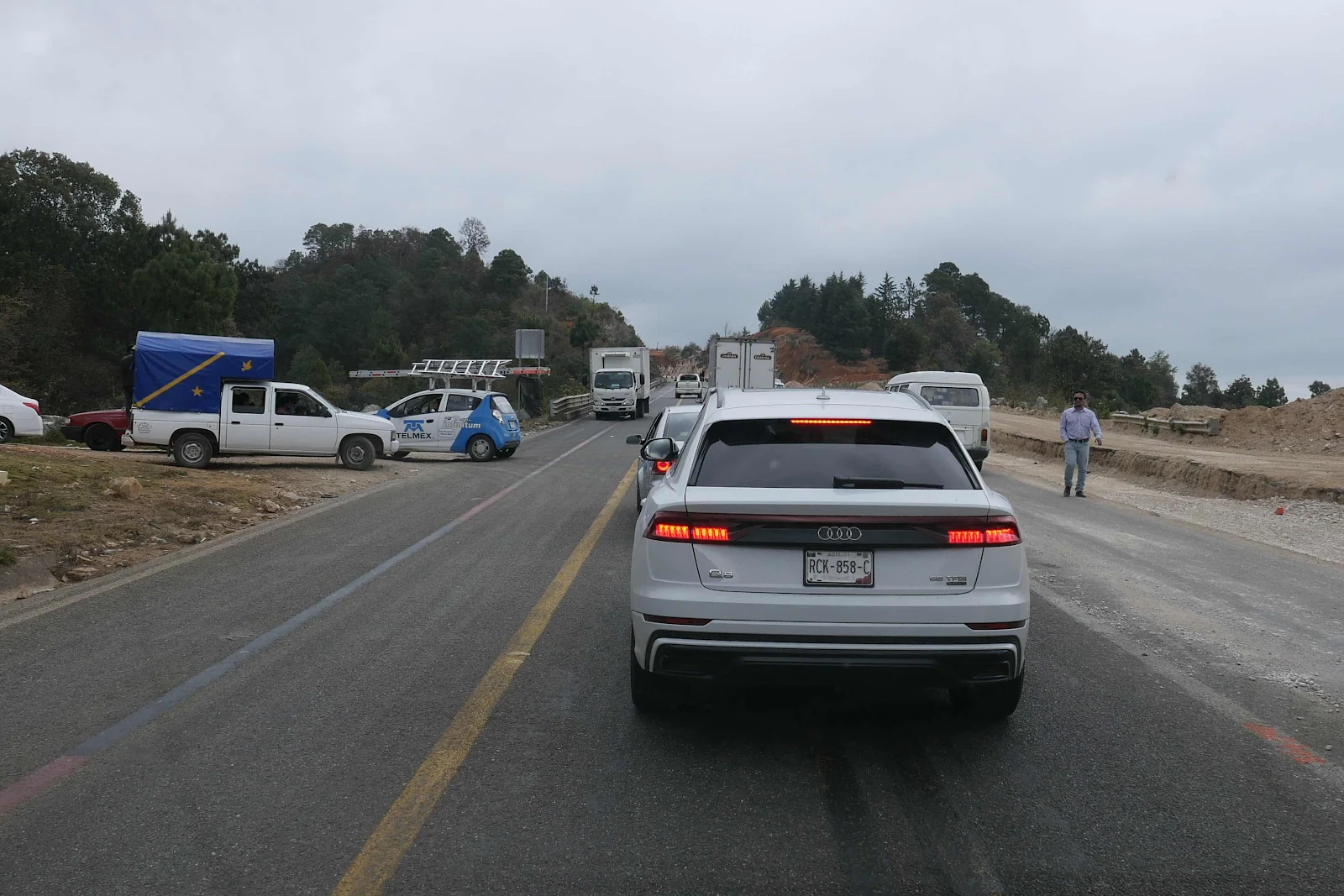Chiapas has a reputation for bloody mindedness. The state has a long history of demanding help from the government and getting none. So the locals protest. They block roads and levy tolls of passing travelers or they make demands and close roads at random to make their irritation felt.
“What’s going on?” The nice lady asked after she approached us and made sure we spoke English, which we do after a fashion.
“A road block,” I replied.
We had almost summited the mountain upon which sits San Cristobal de las Casas, overlooking distant Tuxtla Gutiérrez, the state capital and our starting point that morning. Traffic had ground to a halt and at first we hoped it was the usual Casa de Cobre back up…or a police checkpoint…or on a sliding scale of misery an accident maybe? No. It was the usual road closure by irritated citizens of Mexico’s poorest state.
Collectivos and taxis peeled off up a rather ruinous looking dirt road. Nothing tried nothing gained I swung our 21 foot 9300 pound Promaster in line ready to give it a go. That effort died an agonizing death. The cars ahead of us got stuck in the dirt creating a secondary traffic jam and before we got too committed I made a quick u-turn and went back to carry on up the cuota 190D to the inevitable road block ahead.
And there we were pondering our options when the nice lady walked up and asked if we knew what was what. Rusty had the right attitude for coping with uncertainty.
“Only one way to find out,” I said. I left Layne in charge of Rusty, or the other way around, and took a trudge up a long line of parked trucks.
The first barrier was a selection of smallish rocks staffed by a couple of dozen people a few carrying sticks and all of them wearing masks. I introduced myself as the foreign fish caught in their net and asked what was happening.
They were in a fight over water rights, is the short version as told to me by them. The mayor of San Cristobal sold water rights to a businessman who was now telling the farmers they have to pay a million pesos to irrigate their fields and they were taking this state of affairs rather badly. The road would stay closed until negotiations were completed and victory was theirs. One angry protestor said the road wasn’t opening that night and might open tomorrow. And he looked angry enough that I hardly felt like contradicting him. I did ask for a photo and that set him off. No photos he yelled and looked like thunder. Okay I said. No problem. Not even with your masks on? The cubrebocas had slipped a bit in the conversation. No he said. The guy I had been speaking to intervened and said to the angry man I was cool and if I said I wasn’t taking pictures I wasn’t. Hence the sole long distance shot of the blockade from a long way away that I have attached above. There were dozens more protestors behind the front rank. The highway was filled. We strolled back down.
Layne and I talked after the nice lady went back to her husband and they decided to turn back. They are winter residents at Lake Chapala, an enclave of gringos and they were driving to meet friends in San Cristobal.
We decided to go back to Tuxtla Gutiérrez and regroup. We turned around went down the hill. We paid another three bucks in tolls to get out of the hill climb that we had already paid three bucks to go up. A group we saw on the way down working on a side road. Or blocking it. Who knows?
The Guardia Nacional checkpoint waved us through on the way down as they had on the way up. City traffic was ghastly, a tight slow commute back to the Hilton.
Rusty was disgracefully delighted to be back at the hotel sitting by the door and wagging his tail at the prospect of a night sharing a large soft bed. Layne plunked down 5,000 more points for room service and WiFi. Tacos and a hamburger for dinner while we drank beer and licked our wounds.
Tomorrow is another day. Tomorrow we’ll have another go. I hope the water talks are settled otherwise Layne will lose her desire to go van mountaineering with me on the Guatemalan border. That would be a shame. I think.